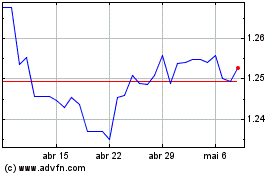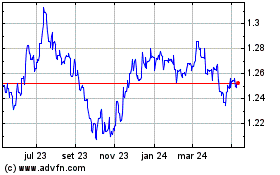Bank Of England Raises Key Rate Further To Tame Inflation
23 Março 2023 - 7:14AM
RTTF2
The Bank of England hiked its key rate for the eleventh
consecutive session on Thursday as an unexpected rise in inflation
outweighed concerns about the recent banking sector turbulence.
The nine-member Monetary Policy Committee decided to lift the
bank rate by 25 basis points to 4.25 percent. This was the highest
rate since 2008.
Seven members of the panel voted for a quarter point hike, while
Swati Dhingra and Silvana Tenreyro again sought to maintain the
status quo.
The bank rate was raised by 415 basis points over the current
tightening cycle that began in December 2021.
"Assuming the tentatively encouraging trends we've seen in price
setting and wage growth numbers continue, we'd expect a pause in
May," ING economists said.
The BoE announcement came after the US Federal Reserve raised
its benchmark rate by 25 basis points on Wednesday and signaled
that the tightening cycle is nearing an end. The bank is expected
to lift the rate just one more time this year.
Last week, the European Central Bank had lifted interest rates
by 50 basis points, in par with the February hike. The Swiss
National Bank also adopted a similar move today.
Most of the BoE members observed that headline inflation had
surprised significantly on the upside and the near-term path of GDP
was likely to be somewhat stronger than expected previously, the
bank said.
"Renewed and sustained demand for labor could still reinforce
the persistence of higher costs in consumer prices, even if
second-round effects related to energy price inflation were to
diminish," the minutes said.
The MPC vowed to continue to monitor closely indications of
persistent inflationary pressures, including the tightness of labor
market conditions and the behavior of wage growth and services
inflation.
"If there were to be evidence of more persistent pressures, then
further tightening in monetary policy would be required," the panel
said.
The BoE said the economy will avoid a recession for now. The
economy is forecast to expand slightly in the second quarter,
compared with the 0.4 percent decline anticipated in the February
Report. Bank staff said the additional fiscal support announced in
the Spring Budget would increase the level of GDP by around 0.3
percent over coming years.
Inflation is still expected to fall significantly in the second
quarter, to a lower rate than anticipated in the February report.
Wage growth is projected to fall back somewhat more quickly than
projected earlier.
In February, inflation unexpectedly rose to 10.4 percent after
slowing for three straight months. As inflation moved away from the
2 percent target, BoE Governor Andrew Bailey wrote an open letter
to the Chancellor explaining the reason for such an increase and
also measures taken in response to higher inflation. In the face of
bank failures and the subsequent volatility in the financial
markets, the Financial Policy Committee reported the MPC that the
UK banking system is well placed to continue supporting the
economy. The FPC judged that the UK banking system maintains robust
capital and strong liquidity positions.
Sterling vs US Dollar (FX:GBPUSD)
Gráfico Histórico de Câmbio
De Mar 2024 até Abr 2024

Sterling vs US Dollar (FX:GBPUSD)
Gráfico Histórico de Câmbio
De Abr 2023 até Abr 2024
